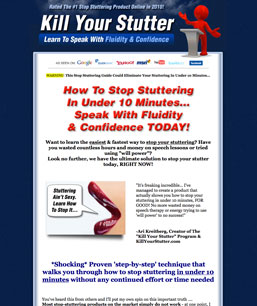
As a person who stutterers, there is nothing wrong with keeping your mind open to different treatments, even if they are not mainstream. But at the same time, we must remember to keep critical faculties intact. When someone tells us they might “cure” our problems, it is easy to lose sight of reality. We are often desperate for help for our stuttering, and are vulnerable to scams that might promise to rid us of our stuttering but succeed only to separate us from our money. Here are some things to ask when trying to gauge the credibility of a product or publication that you might find on the internet or elsewhere.

We issued a warning about this website in an early article, Kill Your Stutter (see image at right), which is part of a serious of sites offering dubious cures for different ailments. The website claims to sell a taperecording that will stop stuttering in under 10 minutes. The cost is $67. By coincidence, to sue in small claims court in Ontario requires a fee of $60, and the owner probably counts on people not bothering to sue him when the "remedy" does not work. This is an example of a highly dubious "treatment" and you are advised to not throw your money away on this so-called cure.
So is it ever okay to purchase treatment, be it a book or tape, over the web? First of all, if the author/creator is represented by a legitimate publisher or representative that is well established and widely recognized, you are probably safe – buy the product if it interests you and you can afford it. It will probably at least be an interesting read. However, many materials on the web are just copyrighted by the writer and do not have a publisher. They should still be sold in accordance with basic marketing principles and standards. Consider these queries:
- Is there a reasonably detailed biography and photo of the author/creator?
If details seem sketchy, be wary – someone who is trying to sell something legitimate will give you as much information or more than you need to make a decision on your purchase. A credible author will back up the product with his or her own reputation and should include a photo. - Is there a way to contact him/her, even if it is through an agent?
Any legitimate author of any credibility is interested in feedback from readers and will provide an email or snail mail address. You should be able to ask questions about the product before buying. An honest seller will be happy to engage in informative dialogue with a potential buyer. - Is the author mentioned on other sources, e.g. the National Stuttering Association website?
Anyone offering credible speech therapy or any form of worthwhile treatment would be at least mentioned or presented on the NSA conference lecture circuit or some other website that addresses up-to-date information about stuttering, such as Stuttertalk. - Does the author say that traditional therapy doesn’t work?
If the product is legitimate, the author should not have to put down other treatment methods in order to sell it to you, or lie and say other therapies can’t help you. - Does the product try to sell other books or materials ?
If you have already paid for something and it starts to sound like a mail order catalogue trying to get you to buy even more stuff, don’t send good money after bad. - Does the site give testimonials?
Nothing promotes a product or service like the positive promotion of a satisfied customer.
If the product marketing passes this test, and you can afford the product, it might be interesting to purchase. Remember that research shows that the best place to put your money with regards to treatment of stuttering is to visit a registered speech-language pathologist. Trying something different may be interesting too, but remember - BUYER BEWARE!